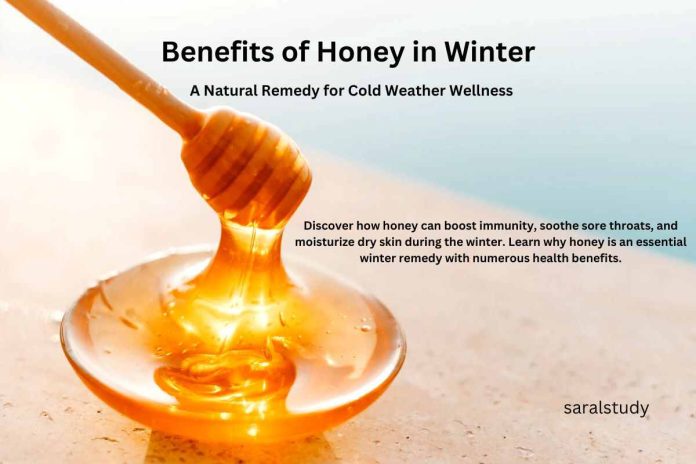Honey is a remarkable substance which is not only a natural sweetener but also contains enzymes, minerals, vitamins, carbohydrates, antioxidants and amino acids. The honey benefits are also exceptional and are useful for healing purposes which is in addition to its great taste and natural energy. Bees make it for themselves and their brood, to live on through the winter.
10 Honey Benefits During the Winter Season
Honey consumption is useful in all seasons but especially in winters, the use of honey is very beneficial.
1. Boosting Immunity with Honey
Honey is not only used to improve eyesight but it is also effective in curing cough problems, asthma, high blood pressure, and blood purification as well as strengthening the heart. Some varieties of honey possess large amounts of friendly bacteria hence it is a good source of probiotics. Honey contains flavonoids and antioxidants which help reduce the risk of some cancers and heart disease. Some research also shows that honey treatment may help disorders such as ulcers and bacterial gastroenteritis.
2. Healing burns
Honey acts as a natural wound sealant and makes the body believe that the burnt area is covered with healthy skin. This dramatically reduces pain and the body then heals the wound from the inside out, rather than scabbing over to heal from the outside (which can trap infection).
3. Natural Relief for Cough and Sore Throat
Honey’s natural soothing properties can help alleviate coughing and sore throat caused by dry winter air or seasonal infections.
A spoonful of honey is more effective at soothing coughs. The World Health Organization lists honey as a demulcent, which is a substance that relieves irritation in the mouth or throat by forming a protective film. Certain researches have also shown that honey works as well as dextromethorphan, a common ingredient in cough medications, to soothe cough and related sleeping difficulties due to upper respiratory tract infections in children.
This is especially handy during the winter months as there is usually an increase in cough and colds due to the season.
4. Antiseptic ointment
Honey has powerful antibacterial and antifungal properties that keep the wound clean (without using petroleum-based jellies). These cleansing properties are triggered when the honey is diluted by plasma from the wound, which causes the glucose oxidase (an enzyme) in honey to create hydrogen peroxide.
5. Moisturizing Skin with Honey
Honey’s moisturizing properties can help dry, chapped skin during winter by acting as a natural humectant.
Honey is a remarkable moisturizer, and can be applied straight on dry or chapped skin, or mixed into a homemade lotion. It’s also a safe, effective and delicious lip balm. This is especially important during winter as the cold and dry weather usually makes the skin very dry and crack lips. Instead of spending money on buying expensive moisturizers and lip balms, one can use honey as a natural moisturizer. It even protects the skin from tanning and fights skin cancer. It is also used in various sunscreens for protection against ultraviolet rays.
6. Acne treatment
Honey’s antibacterial properties help clear up acne too. Honey is a natural cleanser which exfoliates the skin from the inside to bring radiant and clear skin on the outside. It is also recommended to wash the face with honey to keep the skin soft and blemish–free.
7. Honey as an Energy Booster
Honey provides natural energy, helping people combat winter fatigue with its carbohydrates and natural sugars.
Honey is also one of the most effective forms of carbohydrates to ingest just prior to exercise since it is easily digested and released into the body at a steady rate for use during exercise. Honey taken after a workout helps muscles to recuperate.
8. Honey as a sweetener
Honey is a natural sweetener which does not increase the blood sugar level. Honey when taken with warm water and lemon juice in the morning, helps to shed extra weight from the body.
9. Reduce allergy symptoms and strengthen the immune system
If we consume locally produced honey, it may contain pollen spores picked up by the bees from local plants, which will introduce a small amount of allergen into our system. Theoretically, this can activate our immune system and over time can build up natural immunity against the pollen spores which are a leading cause of allergy in people.
10. Honey for Digestion and Gut Health in Winter
Honey’s antioxidant properties help protect the body from winter-induced oxidative stress. Honey aids in digestion and helps maintain gut health, especially important during the cold months when diet and metabolism change.
Honey has been found to stimulate the production of immune cells and it should be a part of every winter medicine cabinet because it is high in antioxidants and it has a lot of immune-boosting properties.
Ways to Incorporate Honey into Your Winter Routine
Learn how to include honey in your daily routine, such as in tea, on toast, or in natural skincare remedies.
1. Honey in Tea or Warm Drinks:
A spoonful of honey in your tea or warm water with lemon makes for a soothing winter beverage, providing warmth and immune support. It’s especially effective for soothing sore throats.
2. Honey on Toast or Oatmeal:
Spread honey over toast or drizzle it on oatmeal for a sweet, nutritious breakfast. This will provide an energy boost and help keep you full during cold winter mornings.
3. Honey as a Natural Cough Syrup:
If you suffer from winter colds or coughs, take a teaspoon of honey directly or mix it with ginger and warm water to make a natural cough remedy.
4. Honey Face Mask for Dry Skin:
Honey’s natural moisturizing properties can be used topically in skincare. Apply raw honey as a face mask to combat dryness or mix it with yogurt or olive oil for an extra hydration boost.
5. Incorporate Honey into Winter Baking:
Add honey to your winter recipes, such as baked goods, instead of sugar for a natural sweetener that provides more nutrients and antioxidants.
Different Types of Honey and Their Benefits
Let’s discuss the different types of honey (e.g., Manuka, Clover, Wildflower) and those honey benefits, particularly in winter.
1. Manuka Honey:
Originating from New Zealand, Manuka honey is prized for its potent antibacterial and anti-inflammatory properties. It’s especially beneficial for winter immune support and soothing sore throats.
2. Clover Honey:
One of the most common varieties, clover honey is mild in flavor and rich in antioxidants. It’s ideal for daily consumption in tea or on toast during the winter months to boost overall health.
3. Buckwheat Honey:
Dark and rich, buckwheat honey has a stronger flavor and contains more antioxidants compared to lighter honey types. It’s excellent for fighting winter cold symptoms and improving digestion.
4. Wildflower Honey:
Collected from a variety of flowers, wildflower honey varies in taste depending on the season and region. Its diverse floral origins provide immune-boosting properties, making it a great all-around honey for winter wellness.
5. Eucalyptus Honey:
Known for its distinctive, slightly medicinal taste, eucalyptus honey can help clear respiratory issues, making it a popular choice for easing winter coughs and colds.
Safety and Precautions When Using Honey
Learn more about precautions and how to use it in moderation to avoid excess sugar intake.
1. Risk of Botulism for Infants:
One of the most critical precautions is to never give honey to children under the age of one. Honey can contain spores of Clostridium botulinum, which may lead to infant botulism, a rare but serious condition.
2. Moderate Consumption to Avoid Excess Sugar Intake:
While honey offers numerous health benefits, it’s still a form of sugar. Consuming too much honey can lead to increased blood sugar levels, weight gain, or even digestive issues. It’s essential to use honey in moderation, especially for individuals with diabetes or those watching their sugar intake.
3. Allergic Reactions to Honey:
Some individuals might be allergic to honey, especially if it’s derived from certain types of pollen. Always test with a small amount if you have pollen allergies or sensitivity before consuming larger quantities.
Conclusion:
Honey is not just a natural sweetener; it’s a powerhouse of health benefits, especially during the winter months. From boosting immunity to soothing sore throats, moisturizing dry skin, and even enhancing digestion, honey offers an array of advantages. Incorporating this natural remedy into your winter wellness routine is a simple and effective way to stay healthy and energized throughout the cold season. Whether consumed or used topically, honey is an invaluable addition to winter self-care.
Related Articles:





